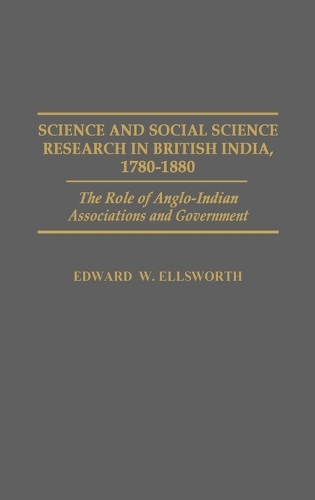
Science and Social Science Research in British India, 1780-1880: The Role of Anglo-Indian Associations and Government
(Hardback)
Publishing Details
Science and Social Science Research in British India, 1780-1880: The Role of Anglo-Indian Associations and Government
By (Author) Edward W. Ellsworth
Bloomsbury Publishing PLC
Praeger Publishers Inc
21st May 1991
United States
Classifications
Tertiary Education
Non Fiction
001.4095409033
Physical Properties
Hardback
240
Description
This conflicting interests, programmes and goals which influenced the emergence of Anglo-Indian social purpose and scientific organizations between 1780 and 1880 are examined in this book. The intellectual energy that promoted the growth of these multi-racial associations and their efforts toward reform was often diverted by British government structures, financial limitations and Indian resistance. Ellsworth's study traces how, despite these obstacles, these Anglo-Indian groups became the foundation for both the official and reformist programmes which were integral to the formation of the Indian Congress at the end of the 19th century. After a brief historical introduction, Ellsworth offers an overview of social science ideology from British and Anglo-Indian perspectives with specific emphasis on the progressive intellectual development, both social and personal, advanced by members of the Bengal, Bombay and Punjab associations. The author traces government involvement in select areas of science associational research and the relationship of that research to official policies and regulations, agri-business goals and the commonwealth. He also deals with key elements of Anglo-Indian science associational programmes shaped by needs of the community but also by the British science world and British and Anglo-Indian economic interests. The creation of a colonial science is thus outlined.
Reviews
Ellsworth's book investigates formal and informal social science- and science-oriented associations in India from 1780 to 1880. These organizations devoted themselves to gathering and analyzing information. They made suggestions to government and initiated their own programs in attempts to ensure continued British control of India and to introduce to India modern (i.e., Western) scientific concerns and methods. Ellsworth discusses the connections between developing scientific concerns in Britain and their transmittal to the Indian context. For instance, he explains how scientific agrarian organizations tried to stimulate selected areas of the Indian economy. He also explains how mixed racial social-purpose organizations provided forums for British and a few Indian members to document community needs and problems. Much of the material supports a premise that the social and economic concerns of these organizations were predicated on the need for Britain to improve India's social conditions and economic life in order to benefit the metropolitan center. The book covers associations within regions of India and details the concerns and contributions of individuals (primarily British) within each of the associations and regions. However, there is little analysis of connections and contributions, making the book read much like a catalog. For graduate and research libraries.-Choice
"Ellsworth's book investigates formal and informal social science- and science-oriented associations in India from 1780 to 1880. These organizations devoted themselves to gathering and analyzing information. They made suggestions to government and initiated their own programs in attempts to ensure continued British control of India and to introduce to India modern (i.e., Western) scientific concerns and methods. Ellsworth discusses the connections between developing scientific concerns in Britain and their transmittal to the Indian context. For instance, he explains how scientific agrarian organizations tried to stimulate selected areas of the Indian economy. He also explains how mixed racial social-purpose organizations provided forums for British and a few Indian members to document community needs and problems. Much of the material supports a premise that the social and economic concerns of these organizations were predicated on the need for Britain to improve India's social conditions and economic life in order to benefit the metropolitan center. The book covers associations within regions of India and details the concerns and contributions of individuals (primarily British) within each of the associations and regions. However, there is little analysis of connections and contributions, making the book read much like a catalog. For graduate and research libraries."-Choice
Author Bio
EDWARD W. ELLSWORTH is Professor of History at Wheelock College. He is the author of Liberators of the Female Mind: The Sherreff Sisters, Educational Reform and the Women's Movement (Greenwood Press, 1979), and numerous articles in journals such as the New England Quarterly Historian, the Lincoln Herald, and the Journal of the Hong Kong Branch of the Royal Asiatic Society.
